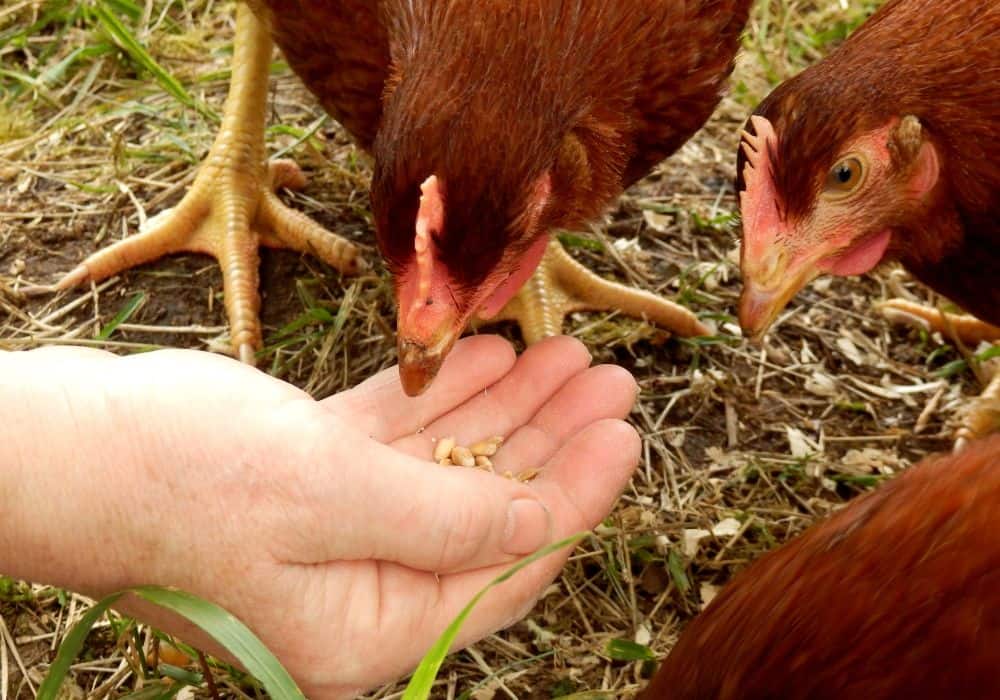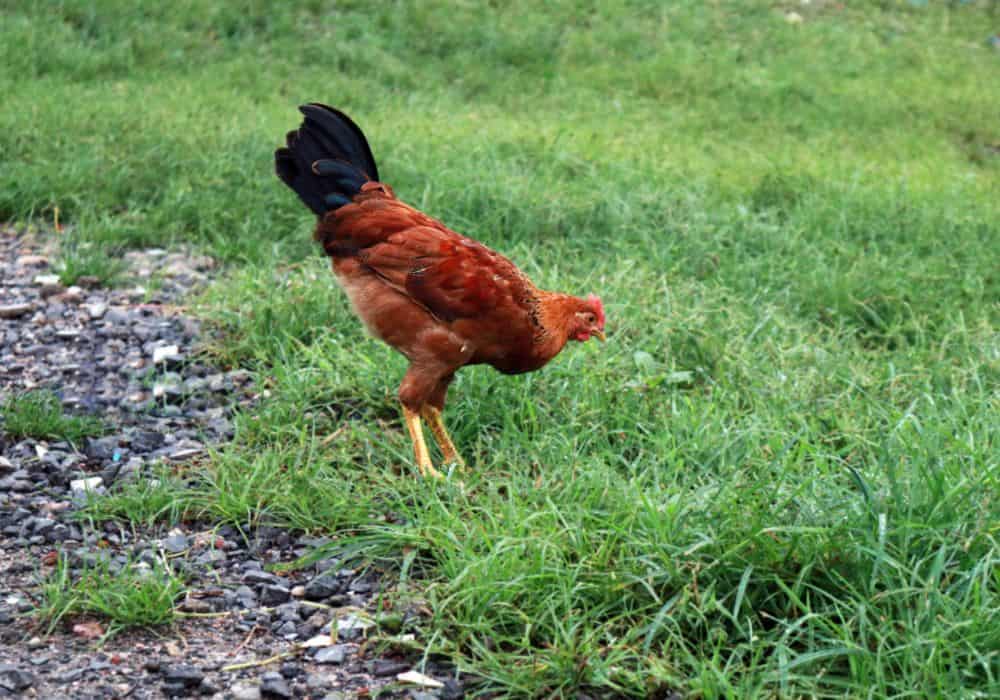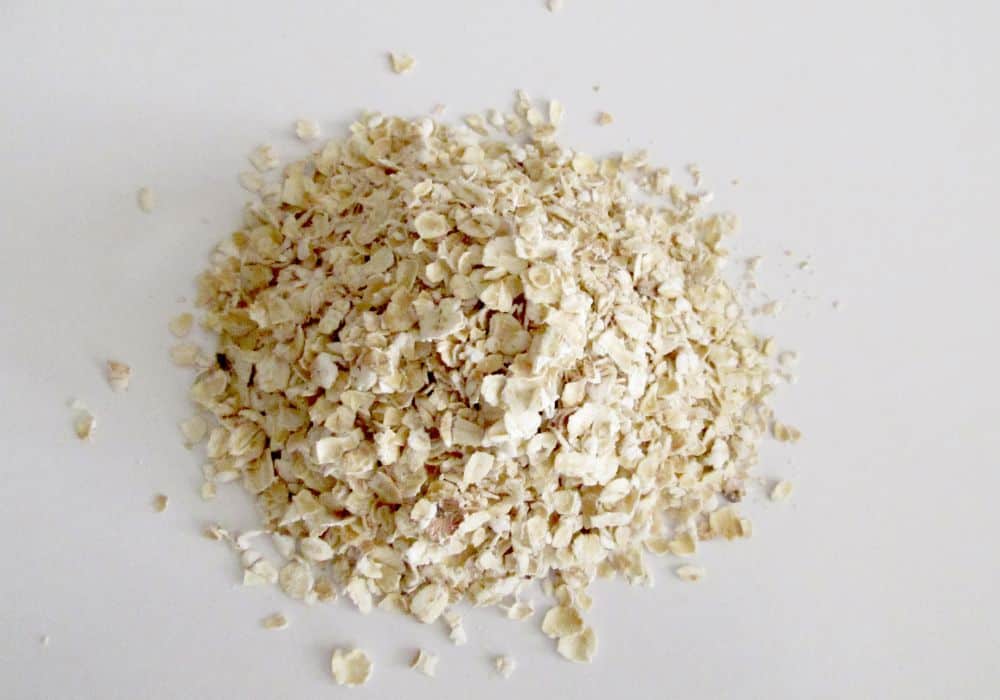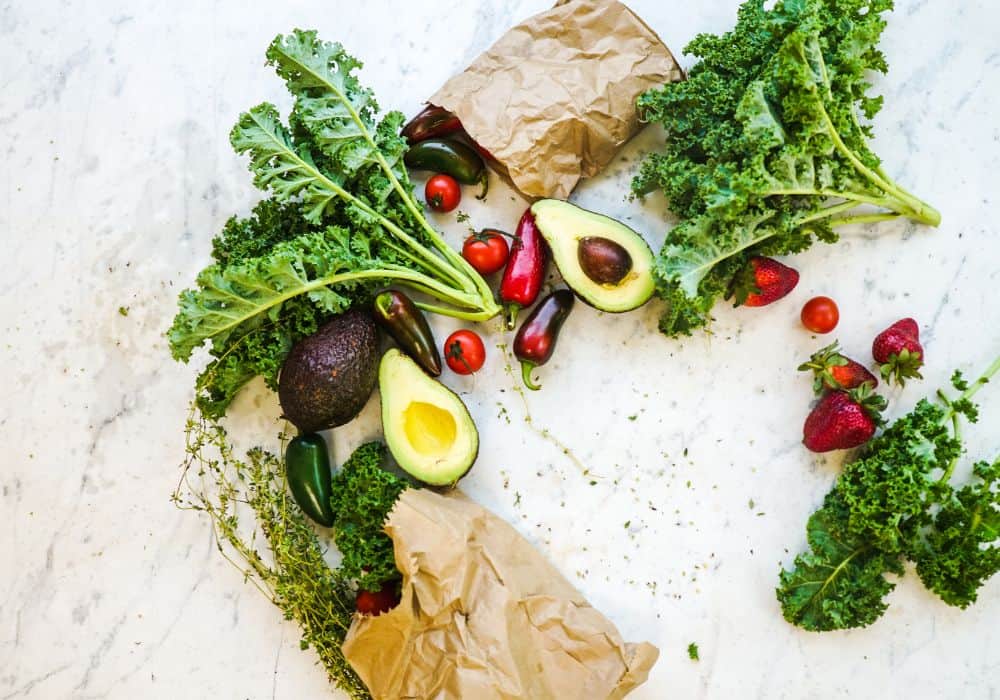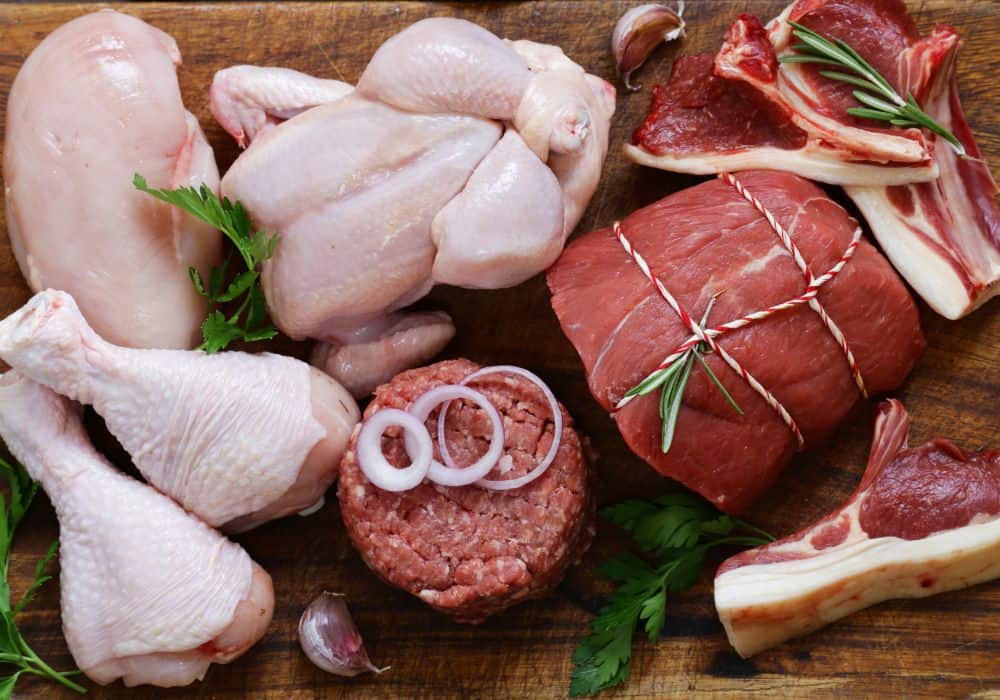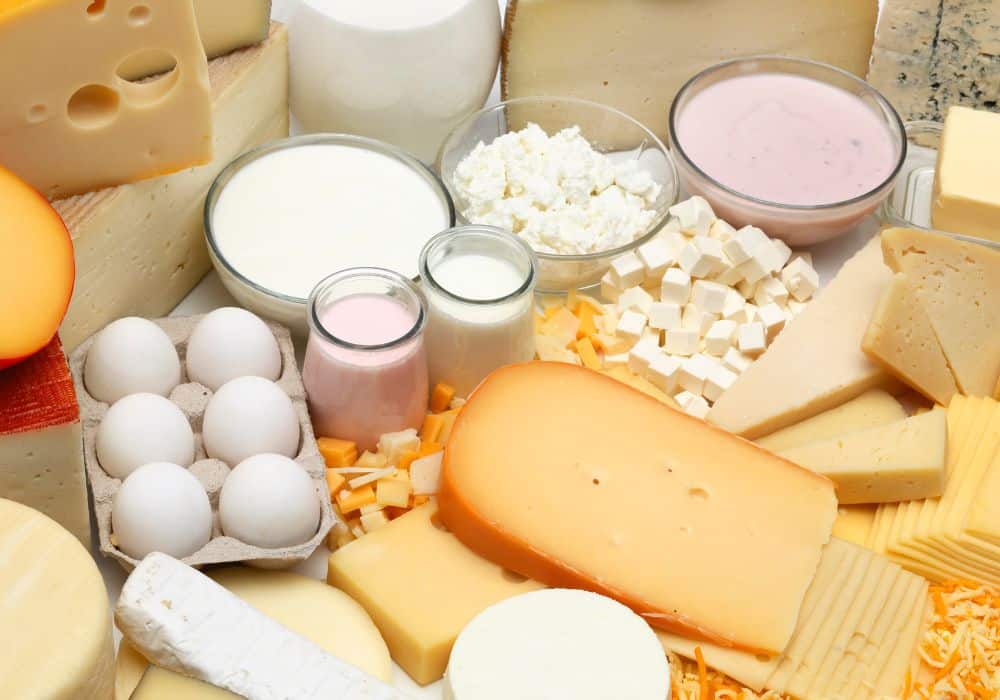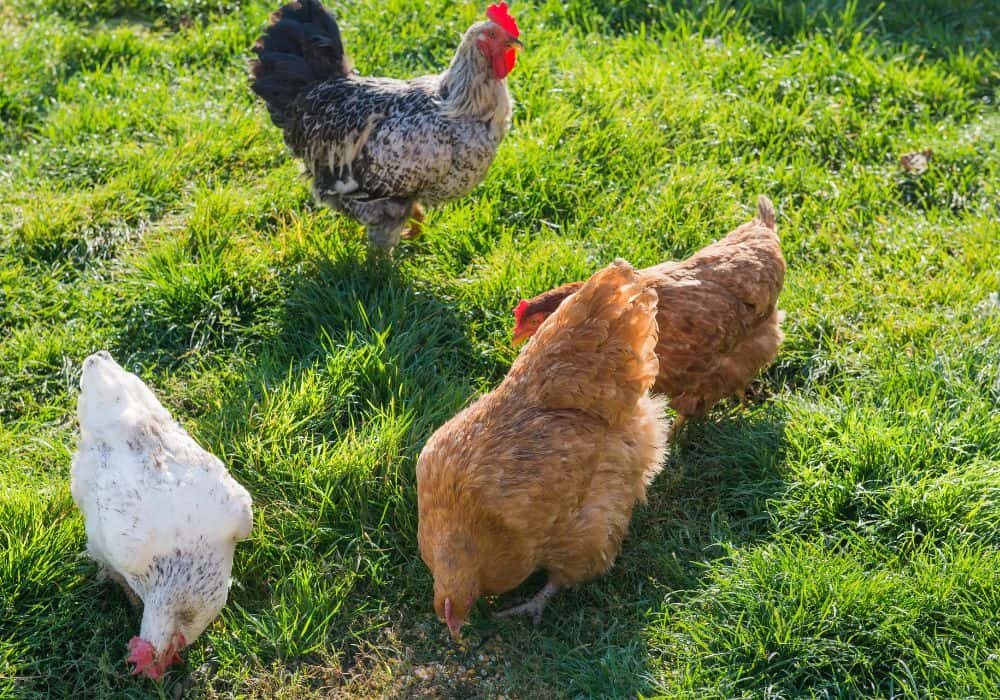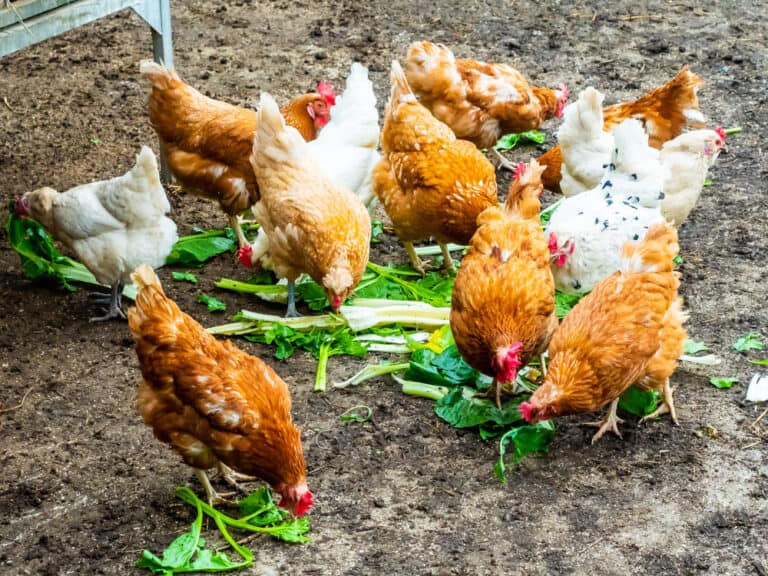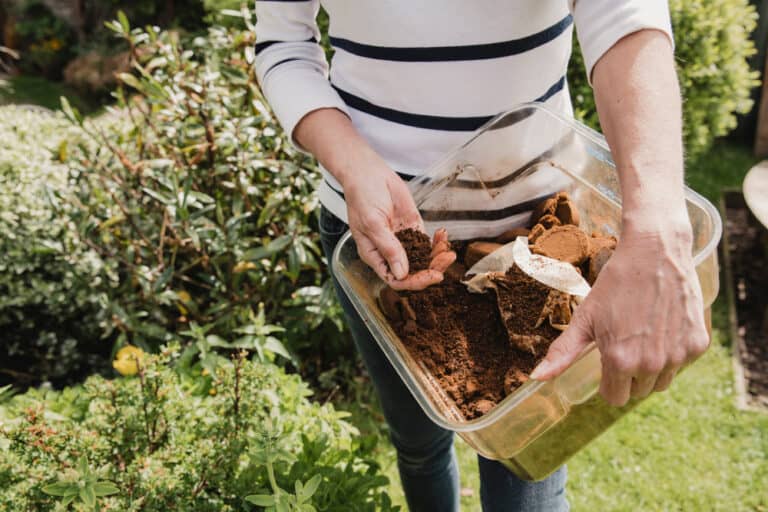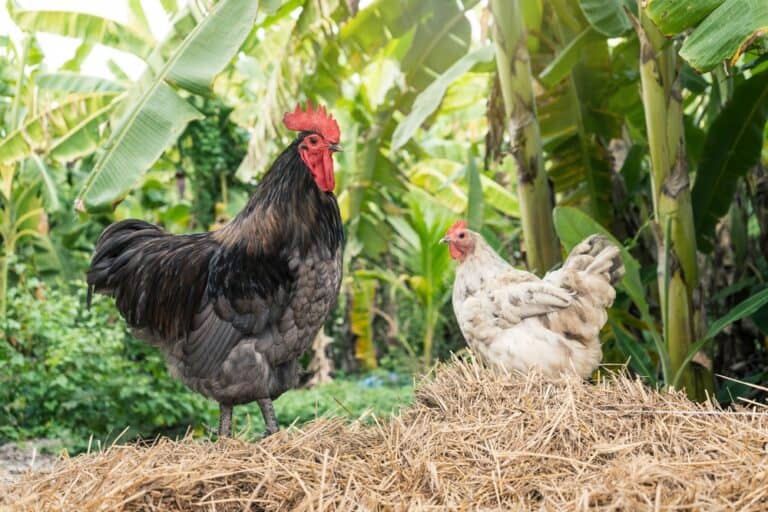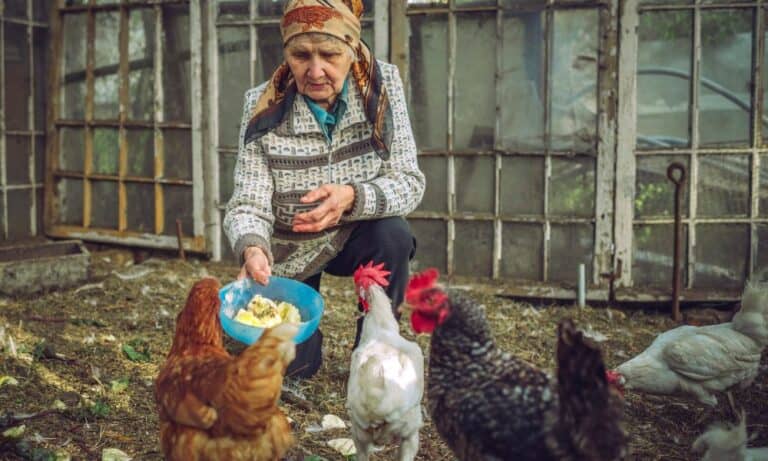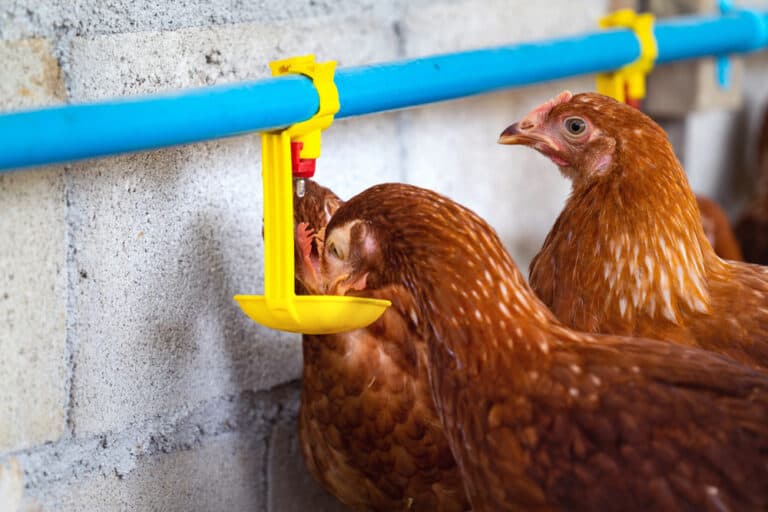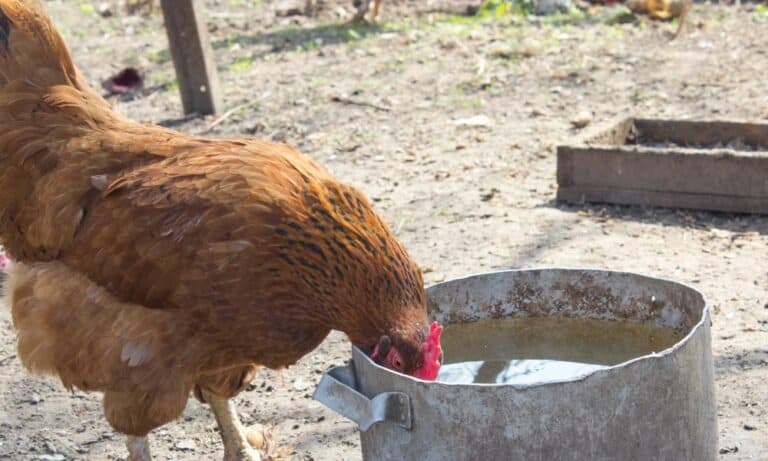Chickens aren’t known to be picky eaters. They are omnivores that eat anything from fruits and veggies to delicious, foraged meats and proteins. This is great for many chicken raisers because it allows them the flexibility of feeding their backyard flock a range of different nutrient-dense foods.
But one wrong move is all it takes to feed your chickens something that can be harmful to their health. Although there are many snacks and treats you can feed your flock, there are some foods that are dangerous for them.
When planning out your chickens’ diet, it’s important to know what is safe for their consumption. So, what can chickens eat and not eat? Today, we’re giving you the ultimate guide. We’ll discuss every food group in your chickens’ diet, plus some no-no’s they should never ingest.
Chicken Feed Should Make Up 90% of Their Diet
Day in and day out, your chickens should mostly be eating commercial chicken feed. These feeds come in different forms, from pellets to mash.
They’re formulated with all the vitamins and nutrients chickens need to be strong and healthy, such as protein and calcium. These also aid in their production of delicious, high-quality eggs and meat in the future.
Curious to see what commercial chicken feed is made of? Watch this educational video to learn more about how this special feed is formulated:
The best part about chicken feed is that they’re very convenient for the busy chicken raiser. Instead of planning out your chickens’ meals, you just have to fill up their feeding tray with chicken feed, and they’ll happily gobble it all up.
Chicken feed should make up 90% of a chicken’s diet. The remaining 10% of their good can be classified as treats. This is because you need to make sure the chickens get the essential nutrients they need before the yummy treats come in. So, they can only be given in moderation.
But what treats can chickens eat and not eat? Let’s take a look at them, one food group at a time.
Foraged Proteins while Free Ranging
First, we have foraged meats while your free-range chickens are exploring the yard. Foraged proteins are among the most natural, organic source of food for chickens.
When they’re left alone to look for meat, they find it in insects, worms, grasshoppers, and other bugs. You can even grow your own mealworms for your chickens to enjoy.
Aside from insects, chickens will also target small animals to munch on their juicy meat. Among their favorites are small toads, frogs, and even rodents.
So, if you have a suspicion that there is a mouse on the farm, don’t put rat poison in the area. If your chickens eat a mouse that has been poisoned, they will be poisoned as well.
Healthy Oats and Grains
Now, we come to our first major food group for snacks—oats and grains.
Grains are amazing for boosting your chickens’ energy because they’re rich in carbohydrates. They can keep your chickens full and satiated for a long time. They also have tons of fiber, which can help regulate the flock’s digestion. They’re very safe for chickens to eat.
Some popular grains that chickens love include corn, wheat, oats, and barley. These are all high in carbohydrates and fiber, and some even have additional nutrients like amino acids in them. However, note that many grains have little nutritional value outside of these minerals.
The only downside is that if you feed them too much of these carbs, your chickens may gain a lot of weight and become obese. Always feed them grains in moderation to avoid this problem.
Fruits and Vegetables
Another food group that makes for awesome treats for chickens is fruits and vegetables. They’re incredibly dense in vitamins and minerals while being low in calories. So, they boost your chickens’ health without making them gain too much weight.
One cool thing about feeding your chickens fruits and veggies is that you can grow the crops yourself. It cuts down on costs for your chickens’ food and helps your farm become more self-sustaining.
In this video, the folks at Fantail Valley Homestead share what vegetables you can grow on your farm to feed to your chickens:
So, what fruits and vegetables do chickens love to eat?
Among their favorites are green, leafy vegetables, like lettuce, kale, Swiss chard, cabbage, and more. These veggies are rich in iron and vitamins A and C, which are amazing for strengthening your chickens’ immune systems.
Veggies like broccoli, carrots, pumpkin, cucumbers, and squash are also good treats for chickens. They’re all rich in fiber, which can help improve digestion and prevent issues like diarrhea within the flock.
When it comes to fruits, chickens adore berries. Strawberries, blueberries, blackberries, and more are rich in antioxidants that protect your chickens from free radical damage. This is excellent for their bodies’ overall health.
Chickens will also eat melons, like watermelon and cantaloupe. Not only are these fruits sweet, refreshing, and vitamin-rich, but they also have tons of hydration, which is good for any hardworking farm animal.
Fruits and veggies chickens cannot eat
But fruits and vegetables aren’t all created equal. While most are safe to feed to your chickens and will give them tons of nutrients and vitamins, others are toxic for them. Here are some of them you should watch out for:
- Avocados: The skin, leaf, and seed of an avocado contain persin, a toxin that is poisonous to birds. If your chickens eat a lot of it, they could die within a day. While the flesh of the avocado is technically safe to eat, it’s better to avoid giving it to your chickens altogether.
- Green potato skins: Potato peels are generally safe to feed to chickens, except when they have green pigments in them. This is a sign that your potatoes can be poisonous to them, so keep them away from your beloved birds.
- The pits of apples, cherries, peaches, and apricots: The pits of fruits like these contain cyanide, which is very toxic to chickens. When their blood is laced with cyanide, the results are almost always fatal.
- Bell pepper stems and leaves: Bell peppers are rich in vitamin C and manganese, both of which are terrific for chickens. However, their stems and leaves contain solanine, which is dangerous when ingested in big amounts.
- Onions: This vegetable contains sulfoxides, which are known to cause Heinz body anemia. This disease destroys red blood cells, thereby slowly killing your chickens.
- Too many citrus fruits: Oranges are excellent for chickens because of their high vitamin C content. However, they are highly acidic. if you feed your chickens too many citrus fruits at a time, it can cause gastrointestinal issues and hyperacidity.
- Rhubarb: The leaves (and sometimes the stalks) of rhubarb contain oxalic acid. When hens ingest this toxic acid, it can lead to soft-shelled eggs and even liver damage.
Meat and Poultry
Among table scraps from the kitchen, another favorite to serve to chickens as treats are cooked meats. And while chickens can live a full life without munching on meat, it’s still a great source of protein.
Chickens can enjoy pork, beef, and yes, even chicken as long as it is fed to them cooked and unseasoned. Salt is very bad for chickens as it messes with their electrolyte count. So, make sure every piece of meat you toss to them is unsalted but thoroughly cooked.
When feeding your chickens meat, ground beef and pork are always better than giving them something huge and solid, like steak. If you want to feed them a big chunk of meat, it’s better to cut it up into tiny pieces so it’s easier to hold in their beaks and swallow.
And although it sounds a bit messed up, chickens can safely eat cooked chicken and turkey meat. These meats are great because they have a lower fat content compared to pork and beef. That way, there is a smaller chance that they will gain too much weight from the meat.
You can toss your chickens a carcass of leftover turkey or chicken, and they’ll eat up all the meat while leaving the bones behind.
Chickens can also be fed cooked eggs. They’re a terrific way to feed baby chicks extra protein since they are soft and easy to chew. Just make sure they’re not runny when you feed them to the flock to avoid digestion issues.
Watch-outs for feeding chickens meat and poultry
The number one thing to look out for when feeding your chickens some meat and poultry is salmonella. Never give your chickens raw meat or eggs so that they don’t ingest harmful bacteria.
If they get salmonella from raw meat and poultry, their health will deteriorate. Not only that, but your risk spreading the disease to your poultry products, like the eggs your hens will lay or the chicken meat you’ll end up with.
You also don’t want to feed your chickens eggs that are still in their eggshells. If they get used to eating eggshells, it can result in cannibalism. Hens might lay an egg, recognize it as a treat, and then munch on it.
Dairy Products
Feeding your chickens dairy products like milk, yogurt, and cheese is tricky. Chickens aren’t built to digest large amounts of dairy. They don’t have the enzymes to break down lactose properly, so they can only handle a little bit of it at a time.
Do not give your chickens milk to drink. Just stick to water to keep them hydrated. And if you want to give them yogurt, stick with plain Greek yogurt only—none of that flavored stuff.
Chickens love cheese, and fortunately, it’s pretty safe to feed them most kinds of cheese.
Hard cheeses like cheddar and gruyere are best because they don’t have a lot of milk in them. Just make sure to chop it up into fine slices so they can eat it better.
Soft cheeses like mozzarella and brie, on the other hand, have some milk but are easier for chickens to eat because of the soft texture.
Avoid wet cheeses, like cottage cheese and Ricotta cheese. These can cause indigestion and diarrhea in chickens.
Other Huge No-no’s for Your Chicken Flock
- Chocolate: Chocolate has high amounts of theobromine and caffeine, both of which are toxic for chickens. It’s the same reason why coffee is a no-no for birds. Some signs of chocolate toxicosis in animals include vomiting, diarrhea, and even full cardiac arrest after ingestion.
- Uncooked kidney beans: When beans are uncooked, they can be lethal to chickens. Beans contain phytohaemagglutinin, a toxin that causes blood in the body to clump together. This can kill chickens in as fast as an hour.
- Salty, processed foods: Food like chips, French fries, Spam, sausages, and other unhealthy junk food should never be given to chickens. The high sodium content can lead to heart disease and obesity, which can result in deformed eggshells and even death.
- Moldy food: Last but not least, chickens cannot eat moldy food. Not only will this taste horrendous, but it can weaken their immune system. Moldy food also has mycotoxins that can cause oral ulcers on chickens’ tongues.
Conclusion
Most of a chicken’s diet should consist of their regular, protein-rich feed. But chickens also love all kinds of treats rich in nutrients, from yummy oats to green, leafy vegetables, to sweet fruits. Building a balanced diet for your chickens with these foods will ensure their happiness and health.
However, remember that there are a handful of foods that you should never feed your beloved birds. As long as you stay away from foods that are toxic for chickens—like avocados, apple seeds, chocolate, moldy food, and more—your chickens should have little to no digestion issues.
Before you toss a snack to your chickens, double-check this guide to see if your table scraps and treats are safe to feed to them. Knowing what your chickens can and cannot eat is essential if you want to keep their health and poultry production efficiency in tip-top shape.

